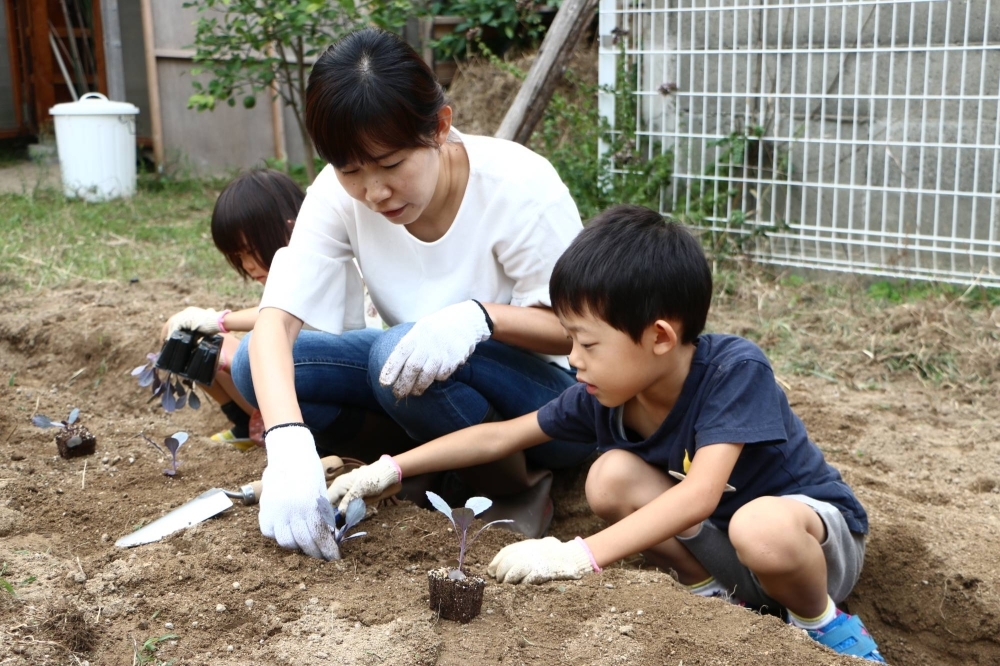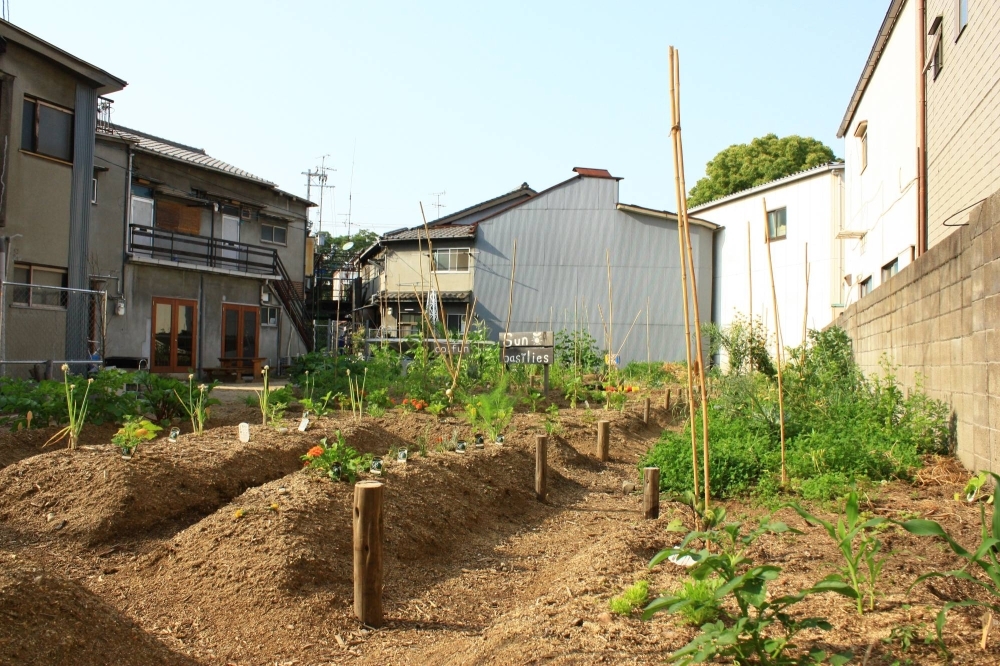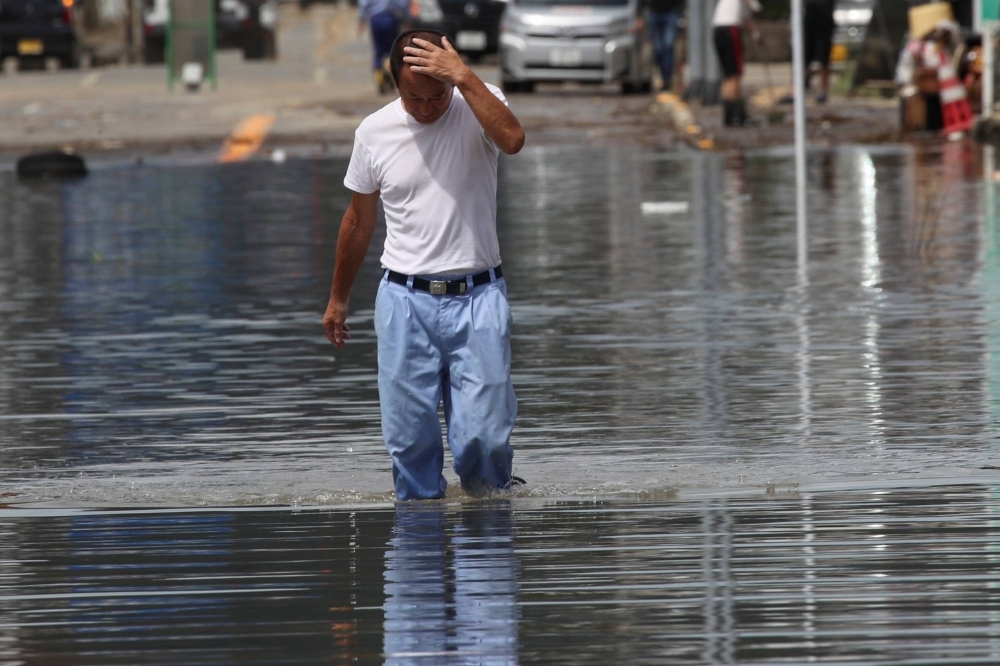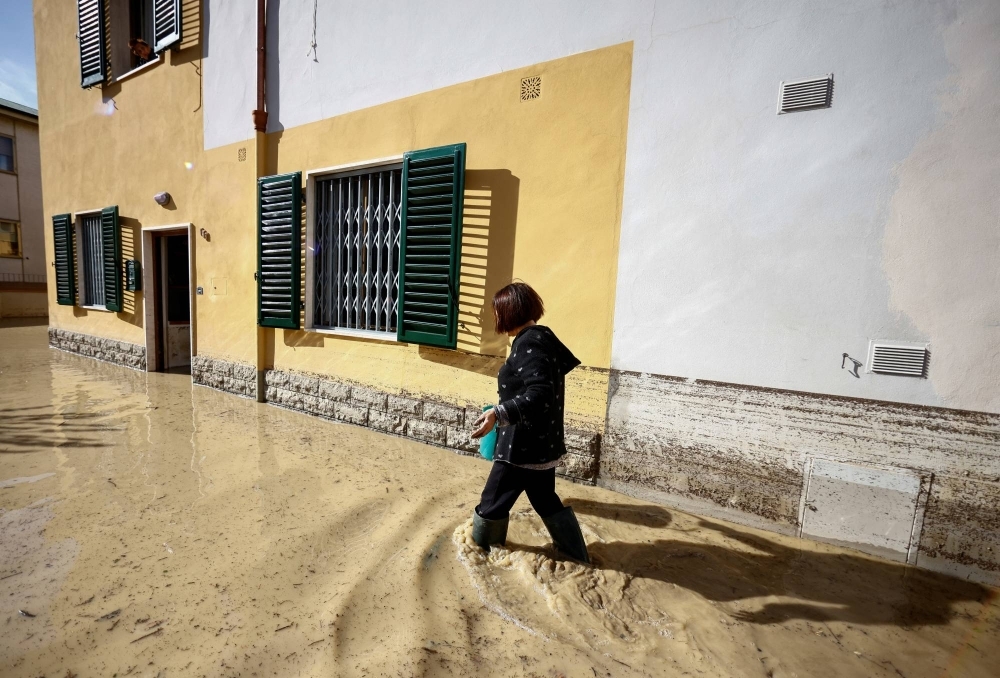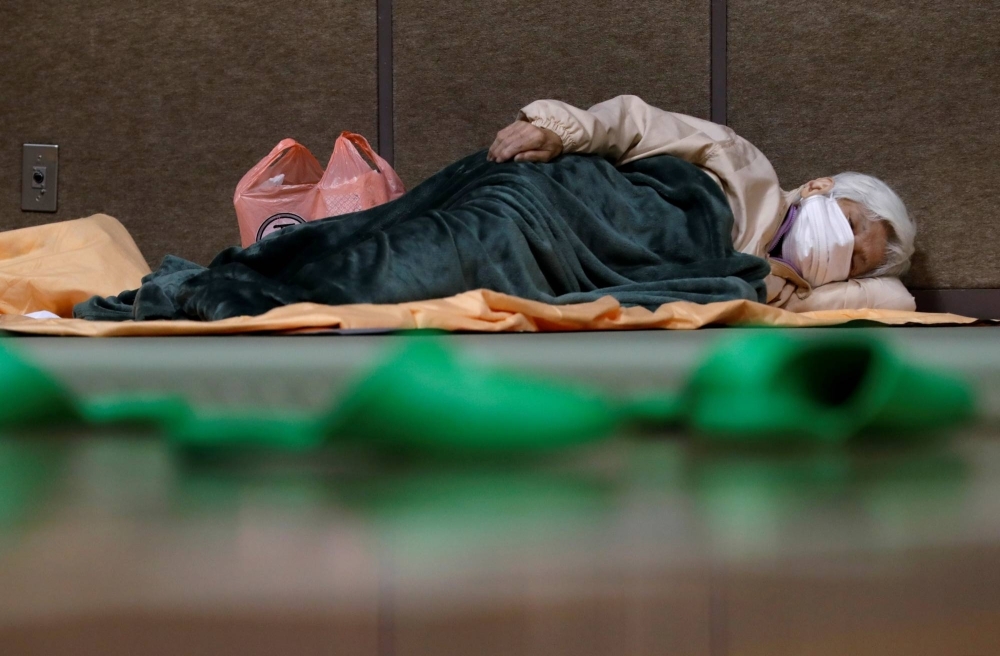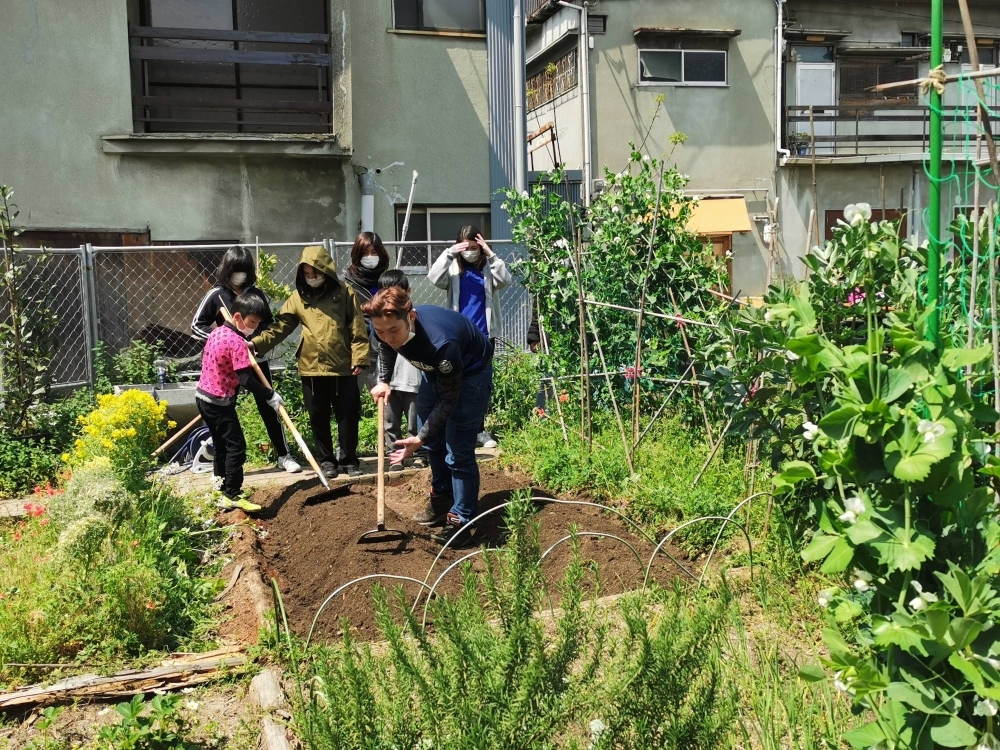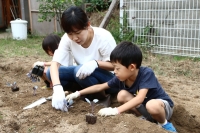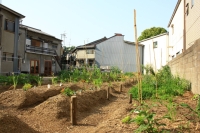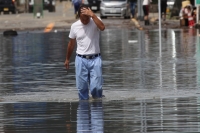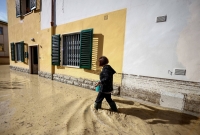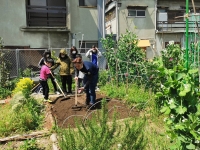Down a narrow street in Osaka’s Suminoe Ward lies a parcel of land that’s a world away from the bustling Namba district a handful of subway stops to the north.
Gone are the bright billboards and rowdy pubs. In their place: lemongrass, peppers and fennel.
Welcome to Minnanouen Kitakagaya, a community garden that allows people living in the densely packed metropolis to rent small plots of land and grow just about whatever they like.
Gardens of this type are not uncommon in Japan’s large urban centers, where most people live in condominiums, apartments or homes with little or no space for a garden.
But as climate change roils food supply chains, these kinds of spaces may become crucial, not only for the role they can play in teaching people how to improve their own food security, but also for mitigating something that’s rising in step with the mercury: climate anxiety.
“People come here to relax,” says Yasutaka Kaneda, who launched the garden in 2011.
“They can have fun with their families or heal themselves.”
Anxiety on the rise
Amid floods, wildfires, droughts and heat waves exacerbated and made more frequent by a warming planet, anxiety spurred by climate change is rising in many parts of the world.
Notably, that includes people living in rich nations in addition to citizens of developing countries, which are generally expected to bear the brunt of climate change.
A 2021 study by the the Pew Research Center of 17 advanced economies found that people who were “very concerned” that climate change would harm them personally had risen by at least 10 percentage points since 2015 in Germany, the United Kingdom, South Korea, Australia and Spain.
Andrew Weaver, a Canadian climate scientist at the University of Victoria whose academic career bookends a stint in provincial politics from 2013 to 2020, has seen that anxiety grow firsthand.
“Prior to getting elected, climate change was always an esoteric problem, in the view of my students, that was going to affect someone else, somewhere else in the world, somewhere in the future,” says Weaver, a former leader of the British Columbia Green Party. “And when I came back (in 2021), I literally was scraping people off the floor in terms of the ... sense of despondency and despair about climate change.”
In an article published by Nature Climate Change earlier this year that looked at climate anxiety, Weaver and co-author Jeremy Fyke noted that media messaging has exacerbated the problem.
“Due in particular to traditional and social media reframing, the aspirational 1.5 (degrees Celsius) global warming threshold — a goal that physical, socioeconomic and infrastructure constraints have now rendered unlikely — is transmuting from a driver of change to an instigator of anxiety,” the authors wrote.
Curiously, only Japan saw a significant decline in climate concern in the Pew study, with 26% of respondents saying they were very concerned, compared with 34% six years earlier. That can perhaps be partially explained by Japan’s “superaged” population — the same survey found that, worldwide, younger adults tend to be more concerned than elderly people — and by what some experts say is a failure by domestic media and politicians to make the connection between disasters like heat waves and floods, and climate change.
Indeed, a 2022 Yale University study found that only 21% of Japanese say they hear about climate change once a week, compared with 66% in Germany, 55% in Australia and 48% in Canada.
Still, a milder level of concern doesn’t equate to no concern at all.
The Yale study found that 88% of Japanese are very or somewhat worried. Meanwhile, 76% believe climate change will harm them “a great deal” or “a moderate amount,” a figure that rises to 85% when respondents were asked about future generations.
For Caroline Hickman, a psychotherapist and lecturer at the University of Bath who specializes in climate anxiety, these fears — long held by climate scientists and spreading as public awareness of climate change grows — are simply a natural response to what’s going on in the world.
“It's important that we don't think that people are getting more worried or people are more anxious (in general),” she says. “They are correct to be more anxious because the climate is changing.
“It’s completely logical.”
What can be done?
The unsettling truth is that, unlike anxiety over wars, recessions or individual disasters, climate anxiety is going to be with us for generations even if the world springs into action in the next few years to limit the worst effects of warming.
In addition, experts note that the climate crisis is also unique because of the simple fact that we’ve all had a hand in creating it, but that presents an opportunity.
“Climate change is the single most empowering issue humans will ever see,” Weaver says. “We’re all part of the problem and we’re all part of the solution.
“That gives us agency, knowing that ... every one of us can make a difference through our own actions and behavior.”
Weaver’s piece in Nature Climate Change explored ways to mitigate one’s own anxiety, and a key takeaway for the researchers was that it doesn’t have to be that complicated — or expensive.
To be sure, potentially pricey lifestyle changes like trading in a gas-powered car for an electric vehicle or moving to a home that’s less at risk from floods can make you feel good about reducing your carbon footprint or improving your climate security.
But even minor steps can have a big impact in reducing climate anxiety, the authors write, and that’s true even if those steps have a negligible effect on actually improving your climate security.
Someone worried about flooding, for example, could make a plan to move all their valuables to a higher floor or shelf. By the same token, someone worried about food security could take up gardening.
Hickman agrees that these kinds of steps can have a positive role to play in reducing a person’s climate anxiety — in mild cases. When it comes to more severe issues, however, she says the climate concern has to be dealt with on an emotional level by accepting the anxiety and on a cognitive level by realizing you are not powerless.
The psychotherapist also notes that real-life steps can help you deal with your anxiety, such as reducing consumption, demanding more from policymakers and even growing some of your own food.
“If you think the future is frightening, then you're going to live in fear. And you're going to feel hopeless and useless and angry,” she says.
Two lenses
Back in Osaka, Kaneda says he started to think more deeply about climate change after he became a father last year.
He’s quick to point out that growing veggies on the 6-square-meter plots at Minnanouen Kitakagaya won’t shelter you from rising food prices, let alone any future food security shocks. But many of the garden’s members have young children and see their participation as a learning opportunity, while others have eyes on retiring to the countryside where they can build a home garden or small farm.
“Most people when they start don’t know how to grow vegetables,” he says. “But when they start they realize they can do it, and they can also learn and share techniques with other members, and then their confidence grows.
“And that’s really important for the future.”
Such skills are especially useful in a disaster-prone country where the population is taught how to build emergency kits in the event of powerful earthquakes or violent typhoons.
Not long after Kaneda launched the project, the Great East Japan Earthquake struck the Tohoku region, highlighting how quickly a disaster can upend feelings of security.
“That made me feel it’s important for people to grow their own food rather than relying on the supermarket,” he says.
There are two lenses through which to see climate change, Weaver says.
Through one lens, there’s hopelessness stemming from a feeling that the problem is so big and so consequential, leaving individuals at a loss for what to do about it.
The other lens, however, is one of tapping into creativity and innovation to find ways to deal with the crisis.
“So I'd like to see the conversation less about what the problem is and more about what the solutions are,” he says. “Because as we talk about solutions, we start to feel agency. And as we feel agency, we start to reduce that anticipatory anxiety of the unknown down the road.”



